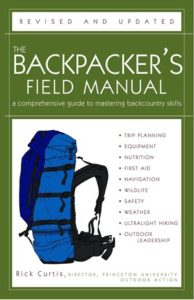I sit here with a brace on my left knee reading Injuries Relating to Hiking with a Pack during National Outdoor Leadership School Courses: A Risk Factor Analysis, published in the current edition of Wilderness and Environmental Medicine. It’s not comforting that my knee wasn’t injured backpacking. I slipped on ice taking out the garbage.
The paper reports a prospective survey of 1283 NOLS summer backpacking participants. We weighted their packs at our outfitting center on issue day, then correlated this with whether the participant was injured while in the field. We found no significant relationship between height, body weight, pack weight, age, gender, pack weight to body weight ratio and risk of injury while hiking with a backpack.
Several military studies report increased rates of blisters and foot pain with increasing pack weight. The packs in these studies weighted in the 47.0kg range, the average NOLS pack was 22.4 kg. There are only a couple of civilian studies on pack weight and injury and they also find no association between pack weight and injury. Frankly, none of this research has the power to say anything definitive on pack weight and injury.
This study has several significant limitations. We know the pack weight at the start of the course, not at the time of injury. We can’t control for terrain, fitness, previous injury and present joint strength, footware etc. We also can’t speak to the impact of pack weight over months and years of backpacking. Hopefully this work primes the pump for others to try to isolate these factors.
We also can’t argue that lighter packs are better. Lighter packs, allowing us to move farther and faster, might be a source of overuse injury themselves.
This study’s conclusion runs counter to the conventional thought that heavy packs cause more injuries. I don’t imagine anyone is silly enough to take this work as reason to relax efforts to manage pack weight. There is no denying that heavy packs are less enjoyable for most backpackers. I for one don’t plan to set aside my efforts to keep my pack as light as I can. I disliked heavy packs back in the day when wool clothing, early generation synthetic sleeping bags, pitons, long ice axes and 111B stoves made weight management a real challenge. I relish the lighter options of modern equipment.
Hamonko M, McIntosh S, Schimelpfenig T, Leemon D. Injuries Relating to Hiking with a Pack during National Outdoor Leadership School Courses: A Risk Factor Analysis. Wilderness & Environmental Medicine, 22, 2–6 (2011)
You can download a copy of the study below.


